#Four Season struggle and arc isn’t going to just take a backseat in the series finale
Explore tagged Tumblr posts
Text
it shouldn’t even need to be said that it’s not “either” mike “or” will that are going to have crucial parts in the plot in st5 and meaningful personal storylines to match. everything is clearly leading up for it to center both of them with respect for the rest of the ensemble. like…… at least to me that’s why it’s such a compelling ship
#am i stupid#like. even considering what the duffer’s have said about will being the focus of s5 it should be a given that mike’s overarching#Four Season struggle and arc isn’t going to just take a backseat in the series finale#his motivations are so clearly tied to will#but theyre also like. His Motivations which are his own and influenced by things apart from will too.#mike’s pov has been so pivotal and central allllllll along it’s not just gonna go away. his emotions have quite literally been the#driving force and the heart of the show. in universe and for the audience. like it’s his story plendhejeidu am i stupid#why is this controversial why are so many things controversial
27 notes
·
View notes
Text
The Arc of Jane “El” Ives/Hopper/Byers
This post will detail her specific character, and why I think her story will end on a bittersweet (heavy on the bitter) note.
But let me make it clear, and say that this is in no way what “will” happen in the next season(s) of stranger things. I’m not a writer on the show, and I can’t say with any certainty that this is “confirmed” or what have you. This is purely my own speculation from a narrative standpoint, and if it isn't to your taste, that's cool, because my take doesn't matter too much.
Oh, El.
Beyond her minimal arc in season one, where her narrative purpose was to show the very serious effects of abuse and manipulation on the part of Brenner, as well as her opening of the gate, her multi-season development has been heading in a very specific, obvious place. Self-actualization and becoming her own person, separate from the lab.
I think a lot of casual watchers came away from season 3 with sort of a “okay,, what now?” type of attitude, and I can’t say that I blame them. Both in season two and three she’s been given the journey of self discovery (with Kali, then Max) and while both carry their own emotional weight, they don’t seem to be held up as important plot lines in comparison to others, such as Max opening up emotionally, and Steve Harrington’s entire season 2 redemption being especially apt examples. As the audience, we are told that El is coming into her own, multiple times, but we are never actually shown long-lasting effects of this, instead opting for one-off easter egg references and her many, many wardrobe changes (which I adore, by the way).
In season one, Dustin, Mike, and Lucas’s stories are all somewhat the same; finding Will and accepting El as their friend. But when you look at season two, everyone has their own different, independent directions to go in. Especially if you focus on every other party member. Dustin & Lucas’s arc’s revolve around love; for Lucas in specific, becoming a more emotionally open, compassionate person. This is vital to his development and subsequent relationship with Max. And as for Dustin, well, he learns that Steve ain’t shit with women, but he gains a valuable relationship in him, even though he doesn’t ‘get the girl’. Will struggles (per usual), primarily with the trials and tribulations of possession-- along with his PTSD. Mike, time and time again shows symptoms of major depression and separation anxiety, his feelings for El having become nearly codependent. Max’s story lies in her horrible family life & opening up, the latter being something her and Lucas share in common. And El’s.... is focused on self acceptance, “who” she is; her familial history. And it was done again in s3. She’s shown who she can be by Max, but she’s still defined by her powers, and by extension her life in Hawkins Lab. I am of the belief that the Upside Down will take a backseat in Season Four, so that the human villains of Dr. Brenner and MKultra can really shine. Brenner was hinted at having survived the demogorgon for a reason, and I’m excited to see where it’ll go, and how it will affect El as a character.
Listen. It would be entirely amiss to not reference her on-again off-again boyfriend, Mike Wheeler. The short version of my thoughts on their relationship (in relation to her arc) is... it isn't meant to last. The long version is that all the charm that their childhood love held fully disappeared come season 2. I'm not saying this because I hate El or Mike, or because I prefer Mike with Will. I side eye their specific relationship because if the Duffer Brothers Incorporated™️ love anything, it’s a slow burn. I won’t get too into it in this post, but seeing as Jopper, Jancy, and even Lumax all had romantic “rivals” in their way,, the fact that Mileven just.... doesn’t? Well, it makes me suspicious. The “endgame” romantic relationships on the show are always flawed in ways that are fixable and realistic, fixed through personal development and communication. But Mike and El haven’t been on the same page since season 1, and if my speculation does end up holding some water, they won’t be seeing eye-to-eye dating wise until they’re broken up for good. Anyways, on with the meta. Sorry for that very long side-bar.
It’s not rare to read people clamoring for El to do a myriad of things to truly “become her own person”, like breaking up with Mike for good and sticking with Max, or staying with Mike and not being Max’s friend anymore, etc.
(it’s funny how all of these have really nothing to do with El as a human being, just a participant in a relationship. makes you think, huh?)
I see people wanting her to develop *more*, and while it’s a valid want, I don’t see it happening the way people expect. The duffers aren't trying to flesh her out at all, as I don’t think she was never meant to be the character of a young girl. Rather, she was meant to be a tragic example of parental abuse and science going too far, her story ending with her death at the end of season one. This initial story is a *tragic* one, which is why I think she's doomed (I have a very strong gut feeling that the series finale will *heavily* mirror season one’s, though my proof is non-existent. just a feeling) Her arc, sad as it is, might be that she never will get to be a normal child, or not for as long as she should. And that's really sad... but also very complex writing which I appreciate.
Here’s where things get sad. In the end, while she may come fully into her own, neither powers or abuse victim defining her, I feel her resolved arc will be short-lived. I think El, ultimately, will end up repeating history. Her fatal flaw of caring too much for the people around her will truly be fatal, and so I think she will ultimately sacrifice herself so that Hawkins will finally be rid of the Upside Down, for good.
Which is exactly the type of heartbreaking thing that I could see them (the writers) doing.
But who knows, maybe they’ll do what they did in season one and hint that she’s not gone after all. Or I'm completely wrong and she’ll live through the finale. Either way, thanks for reading :)
#stranger things meta#stranger things speculation#meta#el hopper meta#jane ives#jane el hopper#el byers#eleven#st4#stranger things#stranger things theory
26 notes
·
View notes
Text
cisco’s story arc really went to hell in the back half of season four/all of season five of the flash huh. like. his series-long arc was clearly supposed to be about him coming into his own as a superhero who was comfortable with his powers. except they made him a superhero too early and made him comfortable with his powers offscreen after spending episodes upon episodes telling us how much he hated them and how much pain they caused him and how he wanted to get rid of them while they consistently made up reasons why he couldn’t for the sake of extending the plot.
clearly, his arc was supposed to be “starts working with the flash purely as support → realizes that he has powers → works to be comfortable with those powers → becomes a superhero → assists with the main conflicts of each season” but instead it became “starts working with the flash purely as support → realizes he has powers → works to be comfortable with those powers (offscreen) → becomes a superhero → is consistently nerfed for plot reasons → goes back on being comfortable with those powers a full season later → gets rid of his powers so that he can have a normal life (something he never expressed a want for in previous seasons).” and like. i get it. you can’t have a guy who can snap his fingers and destroy the world as a superhero when he isn’t the main character. like, clearly he was always going to take a backseat to barry. but it’s literally like...just write a better story then! come up with better reasons for why he can’t use his powers instead of just taking them away with a bullshit reason when it gets too inconvenient to have him around!
i don’t care that he’s potentially going to get his powers back in crisis on infinite earths, because he never should’ve lost them in the first place. cisco’s story should’ve been about overcoming a struggle to be a superhero in classic narrative fashion, not about a guy whose friends don’t appreciate him getting rid of his powers so that he can have a normal life after expressing joy and excitement over helping people through those powers. i understand that you could make the case for him getting tired after approximately five straight years of doing superhero things even without powers, but if that was truly the case, the writers should’ve made that a million times more clear, because now their entire ~4 season narrative for cisco has been tossed out for the sake of relegating him back to a boring role as tech support for the real heroes. it’s stupid and it’s bad writing and they should have put approximately a thousand times more thought into it before they slapped it into the script and sent it off to be filmed.
99 notes
·
View notes
Text
Finding Kurt Hummel: Bash

Masterpost
5x15: Bash
So - we’re here at our sorta Sondheim tribute episode. There isn’t much Sondheim in it - and it is, on a whole, probably the weakest episode in the New York Arc - but hey, there’s some good stuff in here, even if the episode feels a bit uneven.
No One is Alone

We open with a candlelight vigil for a guy who was assaulted because he was gay. The group comes in singing No One is Alone from Into the Woods - and it’s a song about no matter how much your life is screwed up - you aren’t standing alone in this world. A commentary to this group of kids coming from Ohio and struggling to make it together in this big bad world.
Vocally, this song is fantastic - it’s a capella and the balance of voices used between the four of them is done very well. If nothing else, it’s a solid song.
Also Kurt looks so solemn here - because his heart breaks for someone to have to go through things that he’s had to face himself. And he knows how hard and cruel the world can be. Kurt’s often inward when it comes to emotion - but that doesn’t mean compassion and understanding don’t come through. He feels things on a very deep level, and this hits hard due to his own attachment to the situation.
However - I do have a few issues with this scene. It’s the opening, and while lovely, it’s out of context and loses some of the emotional weight it might have had used if there was context around it. But also - this episode feels like there are two very different stories in it, and while I won’t begrudge Samcedes having a plot line - they should! This episode might have worked better having been split in two -- with Kurt’s gay bashing part of it given full attention because the whole plot line is held until the second half of the episode and therefore feels incredibly rushed.
Monday Night Dinner

This scene is so short! I love the idea of Monday Night Dinners - where they all get together and chill and enjoy each other. But this scene has so much exposition it has to get through it feels a little...clunky?
At the start of the scene - you can see Kurt lying on his bed, and Blaine is in there with him since they both come out together. If I had to venture a guess, even if Blaine’s ‘moved out’, I doubt he’s really that ‘moved out’.
Anyway - they explain that the dude in the beginning was gay bashed (and I’ll some more thoughts on him specifically towards the end). And Blaine explains that there are a ton of people in New York who don’t like the fact that the ‘gays’ are taking over and Artie throws out statistics about how it’s getting worse. While I think the conversation is good, I wish the writing had been a little stronger and not so heavy handed.
Meanwhile, Kurt’s not looking so thrilled at talking about people being gay bashed, so he changes the subject to the second point of exposition - it’s midterms week (so are we in March now? - whatever, ah man that messes with Tested being the Valentine’s episode...eh, not thinking hard about it), and they have their theme for their NYADA solos - Sondheim. Kurt’s only halfheartedly excited about it -- cause he’s upset about the dude being gay bashed? Something else? I have to wonder if there was more cut out of this episode - because I’m not entirely sure why Kurt is acting the way he is in this one.
And then, for the third point of exposition - we have Mercedes and Sam playing footsie, cause a majority of this episode is about them. And Kurt’s mildly - yeah, I don’t believe you when Mercedes tries to act like nothing’s going on.
Broadway Baby

Kurt’s sitting in the background while Rachel and Blaine sing Broadway Baby. There’s a bit of stuff you can pick apart for both Rachel and Blaine in this scene but... this meta isn’t really about them. Kurt doesn’t really get any reaction shots during the song, claps nicely at the end, and is the appropriate amount of stunned when Carmen yells at them for doing a duet instead of a solo. And...that’s about it. It’s kinda weird that they even had Kurt in the scene, tbh - is it because it’s a class? Or is Kurt just supporting Blaine? Idk, you pick.
(This episode, just, feels like there’s a lot of holes in it.)
Dinner Theater
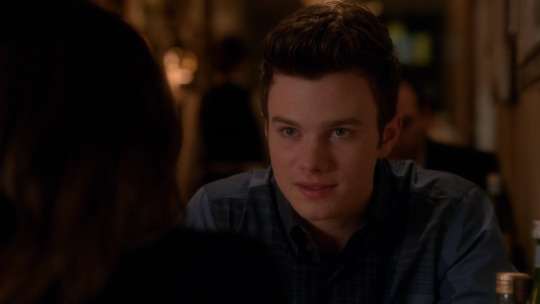
Kurt and Rachel are meeting for dinner, I guess? I’m kind of sad they didn’t do more out and about scenes while the kids were in New York - but at least during this portion of season 5, they’re trying.
Anyway, news travels fast at NYADA - and Kurt’s learned that Rachel’s basically told of Carmen and quit school. Kurt thinks this is a bad idea - because you should have a foundation to grow from, and he thinks that burning her bridges is not the best thing to do. While I get Kurt’s sentiment, I side with Rachel in the first half of this argument. No matter how hard Glee tries to sell it (with actors who made it big not going to college, lol), being in the performing arts does not take a degree - and you can have a successful career by going alternative routes. (Hell - Sam is going to prove this right.) So as much as Kurt’s intentions are sincere and understandable from a kid who wants a solid foot to stand on in a rocky world, he’s not exactly right. However...

Rachel turns immature rather quickly - and her take down of Kurt is unwarranted and driven from the fact that she is insecure about her own stardom - especially in the wake of everything that happened earlier in the season with Santana. While she does make some interesting points about Kurt not going out there and taking risks -- she’s the one who really needs to grow up and not act like a child any time someone pushes against her.
Kurt all but tells her to ‘fuck off’ and would if this wasn’t a PG show. He’s had to deal with her shit in New York close hand for two years now, and really, the kid deserves better than her tantrums, but whatever.
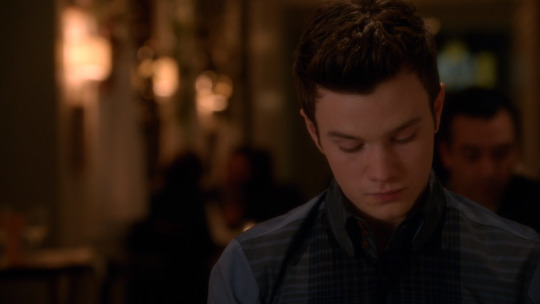
You know, this scene brings some things to head about the overall arc that I’m interested in looking at.
Kurt, so far in the NYC Arc, hasn’t really been that happy. And it’s not Blaine. It’s not even Rachel. There’s something that feels deeper. (And no - I’m not going to assume it’s Chris and his feelings for the show.) Kurt’s having issues with himself and I find it unfortunate that it never really gets explored. I know that some of this leads to Old Dogs, New Tricks, and Season 6 (and my issues are that Kurt’s issues don’t satisfyingly resolve in season 6) but I wish that here the writers had developed more of an individual story for Kurt in this back half of season 5.
Kurt hasn’t had a whole lot to do in season 5 overall, and while Klaine is going to have some stuff, and ultimately be resolved by the end of the season Season 6, Kurt’s individual story hasn’t really gone anywhere since mid-season 4. And I find it a shame. There’s an interesting story here about a kid who’s struggling to go somewhere with his own career - and while they’ve lightly touched upon it with the whole band thing and will in ODNT slightly, there’s not a whole lot to go on.
It’s funny - Kurt’ll get more than most of the characters on Glee, but at this point, if you’re not Rachel Berry, you’re not going to get a fully fleshed out satisfying ending to your story. And I do think that’s one drawback to the second half of the series.
Bashed
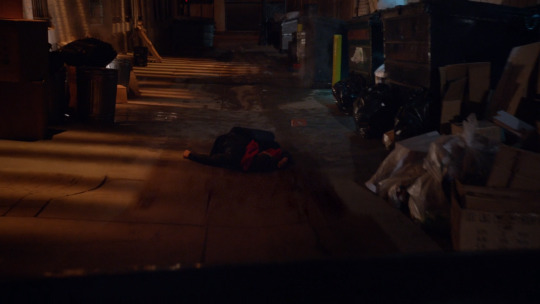
So - next we get the actual violent scene (which is tame for even TV, but jarring when it’s a beloved character in a comedy). Kurt’s walking home, still feeling it from the fight with Rachel - and her words about not taking chances still ringing in his ears (though he’d have done this without that heaviness on him), and goes to help another gay man getting beat up.
So, hmm. First of all - even though one of the dudes yell that there are now two of them, they don’t really know Kurt’s gay - so Kurt’s not really the one being gay bashed here. Secondly, the show makes it a point to really show that the violent guys were drunk -- I think, because Kurt taking on sober dudes might have ended differently.
That brick, though, man.
A lot of this scene actually reminds me of the confrontation with Karofsky back in Never Been Kissed - though I think that scene was more emotionally resonant.
Look, here’s my thing. While I’m glad that the show (finally) chose to address this issue - I kind of wish that this scene had been earlier in the episode, that they might have dug a little deeper into homophobia aspect, and that the reactions were given more time to breath. This whole thing is a nice idea - and an interesting story for Kurt -- but the fact that it sorta takes a backseat to Samcedes (who deserved their own episode about racism) and Rachel’s drama kind of bugs me.
Oh, and then there’s the whole -- of course Kurt’s the one who gets beat up cause nothing nice can happen to him -- that fandom was on at the time. And, you know? Tbh, I think it works for Kurt’s story just fine. I just needed to be developed more.

After a really entertaining scene with Blam, we get the reaction shots to Kurt being in the hospital. And here I do wish there’d been a little more for Blaine. There’s an untold story here about Blaine being one of Kurt’s family - but, since this is before gay marriage, the fact that Blaine might not have been allowed to see Kurt because he wasn’t “family”. And Blaine’s so, so scared for Kurt -- there’s so much they could have explored here. Ah well....
I do find this moment, though, deeply beautiful. Blaine sings to Kurt Not While I’m Around -- Because Blaine, if he could, would do everything in his power to protect Kurt. Does Kurt need a protector? No - not in the way he seemed to way back in Never Been Kissed when they first met. (And this issue is going to be brought up next in Tested.) But there is something to be said, echoed in the opening song, that you don’t have to do all of this alone. Blaine is with Kurt through whatever life hands them - he’s there.
It’s just going to take Kurt a little longer to accept that he doesn’t have to do it alone and not feel stifled by others’ help.

I think, though, what really gets me is the intimacy of this moment. And how it’s allowed to be a m/m moment without being sexual and without commentary. It’s about two people who meaning something to each other in a struggle together, and I just kind of love that that’s always been the heart of Klaine’s story.
Kurt’s been alone for so long -- and in a different way, so has Blaine. But they have each other...
All The Other Ghosts

Burt shows up at the hospital for another Kurt/Burt scene that is nearly perfect. I love how Mike O’Malley plays a scared parent. Just love it. I love that Burt yells cause he can’t contain himself, and that he expresses that while he’s proud of Kurt -- points out how it was a really stupid decision, too -- that the guys could have had a gun, that he could have been killed.
At the heart of Kurt’s story, originally, was a story about a gay kid and his dad -- and I’m glad that late in the series they’re able to bring that back again in such an emotionally relevant way. Kurt and Burt have grown in so many ways -- but at the end of the day, Burt is still worried and deeply cares about his kid, and no matter how old you get -- a good parent will continue to do so.

Meanwhile - we get a little bit of insight into Kurt’s head but not enough. Kurt mentions that he’s been fighting these guys -- these demons of society that tell him that he’s not wanted in it -- for a long time. And instead of just taking it like he often did as a kid, he’s fighting back. That fight was always kind of there -- though through fashion and not fists, and then in season 2 it was more outwardly being proud of who he was. But yeah, the commentary of the episode (and another thing I wish had been developed better) is that sometimes it’s violent and sometime’s it’s not as pretty as singing a song about being Born This Way.
Kurt says he wishes he’d get a scar -- which, besides being a little morbid, is a way for Kurt to remember his continued fight.
There is on clunky bit, though -- when Kurt says he finally realizes who he is and that’s.... Burt’s son? Huh? I mean - I feel like they were tiptoeing around the whole ‘what a real man is’ that they’d mostly dropped after Finn died. But it also feels like they weren’t really sure what Kurt’s realization was? Something a little more explicit to what that means for Kurt as a character might have been nice.
I have to wonder, though, cause there’s some subtext here that I can’t fully read -- if Kurt going out and jumping into fights is a little bit like way back in End of Twerk when he was finding a way to be alive again. Like I said earlier -- Kurt just seems like he’s...not in a good place, and hasn’t been since Finn died, and I don’t know if it’s that, or a culmination of that with other things, but it feels like it’s hanging over this scene. I can’t quite pinpoint what I’m feeling here, though, and unfortunately the narrative doesn’t give us much to work on. Ah well.
Sidewalk
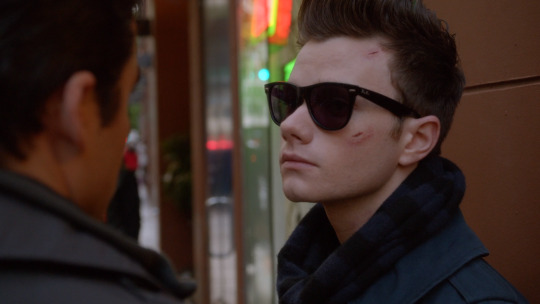
Oh this scene... I’d love to know what the original purpose this scene had in the script because I’m not fully feeling it the episode.
Kurt and Blaine meet near that sidewalk vigil and Blaine says that Kurt doesn’t have to do this -- do what? Go outside? Walk five steps? Place flowers on the sidewalk? I get that Blaine is concerned because Kurt’s just getting to his recovery and Blaine wants to make sure he’s okay. And I also get that part of this moment is about the two of them going out together to face the reality that even in a ‘safer’ place such as New York -- there’s still the reality that there’s a lot of hate for them in the world.
But I’m still not sure I get the dialogue here.
I also wonder, like many, if in the first draft of this episode the guy died from being beat up. I wonder if the censors (or whoever) thought it was too dark and they had to go back and change it -- Blaine’s line that he lived definitely sounds looped. But idk, I think the story would have been stronger had the guy died. Not only would it show the reality of what is going on -- and that hate has awful consequence, but then the scene itself would make more sense. I mean -- why would people have a memorial for a person who lived? Idk, show, idk.
This is also a where I take a moment and talk about how I wish Kurt and Blaine had had a conversation about this with each other. About how Kurt’s been hurt and how each of them are dealing with it. I suppose a lot of that goes into Tested, but it wouldn’t have hurt to give them something here, too. It does feel like there’s a little bit missing and we have to infer a bunch of stuff from subtext.
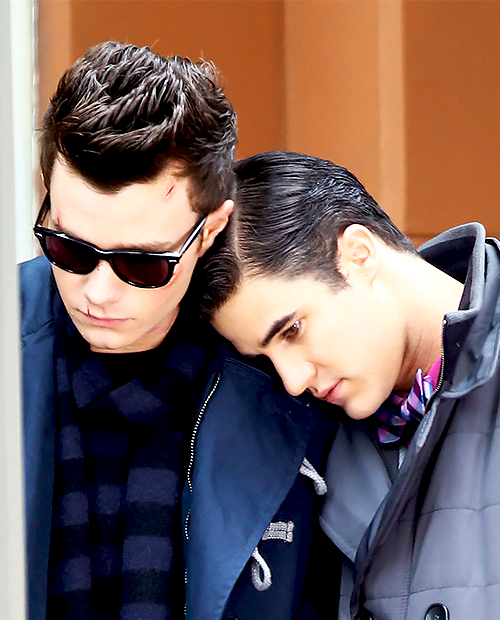
Also - can we take a second and talk about this production still from the episode?
I like it because it’s a closer angle of the two of them not shown in the actual episode. I wrote a whole tangent on it here. But mostly -- like the earlier scene, it’s quiet and intimate moment. And Kurt’s angry-sad and Blaine’s sad-sad, and there’s a whole lot to this picture that isn’t being said. But mostly, I just love everything that it says about their relationship, and how they’ve kinda flipped roles over the course of the years, but ultimately, how they’re in everything together.
No Apologies Needed
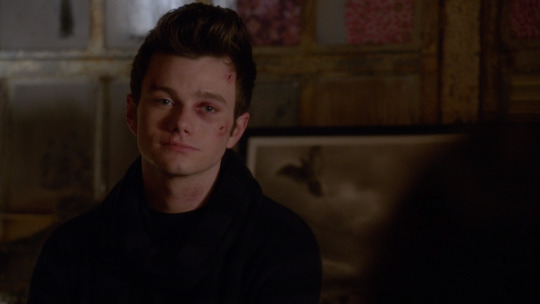
Oh Hummelberry scenes, I’m not even sure how I feel about you anymore.
Rachel comes into apologize for being awful - which is a nice turn of events, really. Kurt’s all pfft I’m over it - let’s talk about you getting back into school cause there are other more important things in life stupid fights and being mad at each other.
Idk. The scene works, it’s always nice when they let Rachel show a little humility. And I kind of enjoy that Kurt expresses how much he cares for her even if he’s not letting her 100% off the hook. Still -- sometimes I think Rachel gets the better end of the bargain, and maybe I don’t always want these issues to be resolved in under ten minutes.
Plus, I’m always side-eyeing when they use Kurt’s troubles to prop up Rachel’s character.

Using this really crappy still to show that, yes, Kurt’s happy to see Blaine. Suck it haters.

Kurt turns his head because Samcedes has arrived, but otherwise, he had been fully engaged and happy with the affection Blaine was giving him. Ah the small things.
Anyway - Sam and Mercedes proclaim they’re together. Kurt gives us a full history of their relationship and then claims he doesn’t see chemistry there (really Kurt? Way to be supportive) but then Sam and Mercedes just make out in front of everyone. And Kurt doesn’t even get a reaction shot. Sure, show. sure.

A toast to Kurt! Because he survived and now has to sing a Sondheim song about it.
Also, if you’re wondering why Blaine isn’t sitting next to Kurt - it has more to do with blocking, and line distribution, and camera angels then it does with anything said or not said about the relationship. Just sayin’.
I’m Still Here

Kurt’s last solo on the show. Oh man. Hmmm.
First of all, let’s just say that Kurt singing a song traditionally done by an elderly woman from the golden age of Broadway seems about right. This song is most definitely a Kurt-ish song, and a nice way to end his solo musical journey that doing something profoundly him.
Kurt (Chris) sounds nice on the track, even if he does botch a few of the pronunciations -- he’s good at this kind of thing, and with the added choreography of Kurt’s traditional dance method, it’s a fine performance. But then, I mean, go watch Elaine Stritch do it on YouTube and you can see why I’m a little - eh - about this performance. There’s a reason it’s meant for an 80yo woman and not for a 20yo guy. Sorry :(
The sentiment is nice though, and while I’m sad that we won’t get another full solo from Kurt, I like that he’s definite in his statement. Kurt Hummel is here -- he is who he is -- and after all the shit the show’s given him (plus a little bit more coming up) he’ll always be here. In our hearts. :D
As an aside - I like the little moments with Burt -- the fact that Kurt’s clearly been singing this song since he was a kid because Burt knows all the words. And I love that Blaine is sitting at the family table, and just beaming with pride.

And at the end of the day - Kurt’s triumphantly standing on a piano because there’s nothing more Kurt than that. The story might be a little wobbly, sure, Kurt ultimately gets the happy ending -- and that’s the message that Glee is really here for.
One More Thing

The story is pretty much over - but there is this one last thing I want to address because it was such a source of contention back when this aired.
There was this issue that Kurt was cold to Blaine during this episode. And -- I just don’t see it? Kurt’s having some issues, and yeah, I wish the narrative would have allowed for Kurt and Blaine to have a private conversation about things, but that’s more technical issues than actual problems within the narrative.
Speaking of technical -- this last scene. There’s a kind of goof, where Blaine moves in to kiss Kurt, but Kurt, not knowing turns away. But the still above is right after that happens - where Kurt looks to Blaine and is beaming. So here’s my thing. I think it was probably an improv’d moment from Darren, because when you watch the scene it’s very obvious that Chris isn’t aware it’s happening. Why the editors chose that take? I don’t know. I could have a full rant about how I think the editors weren’t great on this show. But no - I think it has no bearing on how Kurt and Blaine feel or even how Chris was trying to play the moment. I think it was a goof that made it’s way into the episode.
Kinda like that time Naya punched Darren in the face in the background. (DSB - New Directions, yes it happened) Does Santana not like Blaine?!?? No - it’s an accident.
And I think that’s what happens -- I know we all wanna hang on to every little second cause Glee spends a lot of seconds squandering them. And Glee had, in the past, a knack for having brilliant background moments. But sometimes a goof is just a goof, and a questionable directing/editing choice is just that. I feel like getting our panties in a twist every time something doesn’t go perfectly on this show is a waste of energy. Ah well...
32 notes
·
View notes
Text
Episode 57: Reformed

“So what, I’m not strong enough?”
After Rose’s Scabbard, episodes zeroing in on the Gems as individuals took a backseat to the buildup and aftermath of Peridot’n’Pals crashing the party. But now that the dust has settled, it’s the perfect time to check in with how our leads are doing in the brief status quo between Jailbreak and the meat of Season 2: the Week of Sardonyx and the Cluster Arc (a.k.a. Peridot’n’New Pals).
Reformed, Sworn to the Sword, and Keeping It Together provide an emotional baseline for Amethyst, Pearl, and Garnet that informs their character arcs through the end of Season 3: Amethyst struggles with her self-image in Reformed, Pearl struggles with her low self-worth and lingering grief over Rose in Sworn to the Sword, and Garnet struggles with a misunderstanding and under-appreciation of fusion in Keeping It Together, and yeah, that’s pretty much what they’re up to for the next forty episodes or so.
What’s cool is that all three arcs use the same general structure to tell different stories. Each Gem establishes what her arc is going to be about in the episodes listed above, then examines this subject in greater detail during the Week of Sardonyx, gets a Peridot episode that examines the subject even further while characterizing our newest Crystal Gem (Back to the Barn for Pearl, Too Far for Amethyst, Log Date 7 15 2 for Garnet), and resolves the arc with Steven (The Answer for Garnet, Mr. Greg for Pearl, Crack the Whip through Earthlings for Amethyst). Garnet does it in a different order than the others, but she still hits all the beats.
(Technically, Love Letters also features Garnet facing someone who doesn’t understand fusion, and can easily be read as the kickoff to her arc. However, I consider it a Jamie episode featuring Garnet more than a true Garnet episode, especially next to Keeping It Together.)
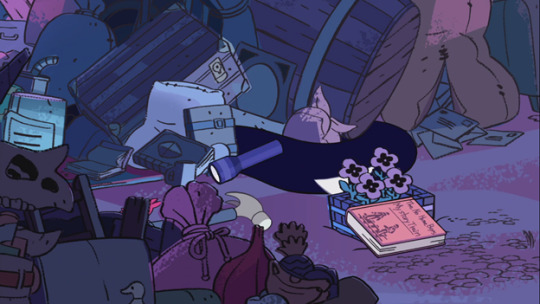
Amethyst got a great one-two punch in On the Run and Maximum Capacity late in Season 1, but invokes the former far more than the latter in this new arc as she works through her self-identity issues; it’s no coincidence that we see a No Home Boys book among her clutter.
With that in mind, Reformed is a brilliant look into Amethyst’s psyche; it reviews everything we need to know about her, which is remarkable given the absence of her series-wide foil Pearl. She’s messy, impulsive, and veers between taking things too lightly and taking things too personally. Our resident shapeshifter's rapid-fire reformations display three major issues—two of which are tellingly related to Pearl and Garnet—that ultimately highlight her discomfort with being in her own skin.

Amethyst’s first new form looks normal at first, and her initial dismay at having feet for hands is dismissed with a joke. She makes a show of doing it on purpose to save face in front of Steven, but as she grows more annoyed with his probing questions (the personality quiz is a great running gag that gives Steven something to do while keeping the focus on Amethyst), she uses those feet to speed up: even before Garnet spells out that she was too impulsive, her form reflects her self-destructive distaste for slowing down and thinking things through. And just before she’s poofed again, she reveals a gigantic ear concealed by her hair, which acts as nifty visual shorthand for how she’s always listening to criticism.
The flaws exhibited here—impulsiveness and sensitivity to judgment—are two of Amethyst’s most basic attributes. They’re just part of her personality, tied with her positive traits (like her ability to improvise) and negative traits (her penchant for self-loathing), and, as we’ll see in her next two forms, they define how she interacts with her team. It makes all the sense of the world for such an Amethyst-centric form to be her first, because when anxiety makes you hate thinking about yourself, thinking about yourself is pretty much all you do.
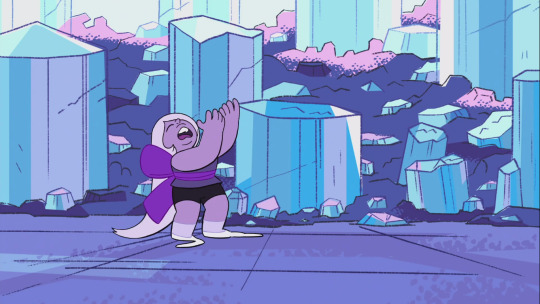
Amethyst’s second form is parody of Pearl that also begins as a joke, and plays out that way for most of the sequence. However, the silliness from her gigantic hair and bow is marred by her sickly, floppy feet: like before, something is clearly wrong.
Michaela Dietz does a mean Deedee Magno Hall, and I mean that in a “it’s great” sense as well as an “Amethyst’s being snotty” sense; the jangling piano theme is a perfect accompaniment to the imitation. But while Amethyst nails Pearl’s need for tidiness and order, she starts slipping into her own problems when diagnosing their shared desperation for approval. Sure enough, the moment Garnet says that her form is ridiculous, Amethyst—who just admitted it was a joke, mind you—loses her cool.
It’s been a long time coming, but Amethyst finally gets her chance to say “Strong” in a meaningful way: in this case, she misconstrues Garnet’s need for team cohesion as a slight on her power, and I love that this happens while she still looks like Pearl, whose own issues with physical might kicks off the show’s thesis on true strength. More than any other Gem, Amethyst is defined by her relationship with physical strength, and we’ll see plenty of this as her arc progresses.
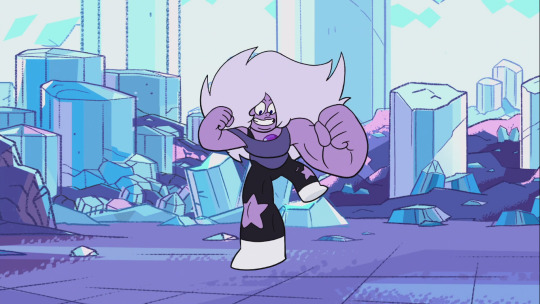
But for now, it leads to her third form, a twisted mess of mass that’s as absurd as her other two tries but without the humor. Steven’s immediate reaction is how painful it looks, and his observation is backed up by hideous sound design as she stretches into shape.
After giving Pearl a try, this new body is a sick reflection of Garnet in the most primal sense: tough and huge. But Amethyst misses what makes her leader so special, and we Garnet’s disappointment destroy Amethyst’s bravado before she takes out her frustration on the Slinker. There’s a brief pause in the action as Garnet saves Steven from rubble and continues to protect him, because spoiler alert teamwork is more important than walloping monsters.
Amethyst’s battle is scored with a variation of Garnet’s bass, but the fight itself is signature Amethyst: she’s a berserker who doesn’t think about her own well-being, which combines with her failure to reform properly to underscore Steven’s realization that she doesn’t want to think about herself. Despite her rapidly depleting muscle mass, Amethyst is only poofed for the last time after hearing Steven’s discovery, and that’s what it takes for her to come back as a same-and-improved variant of herself. And even then, she feels the need to hide her true feelings about being hugged.
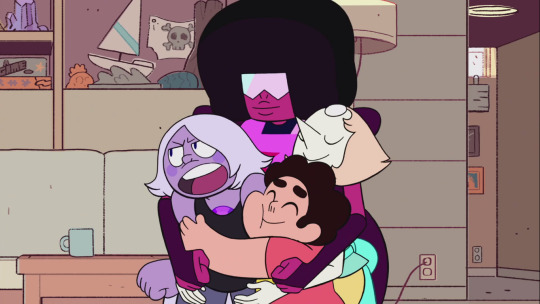
The inherent sadness of the episode is eased along by some of the best slapstick this side of Kindergarten Kid. When Pearl and Garnet get poofed in Steven the Sword Fighter and The Return, they’re traumatic experiences for Steven and the audience. But Amethyst goes out like a dark punchline, and even gets a literal punchline in Steven’s hilarious “Is it weird I’m getting numb to this?” to sate the rule of three. Like Tiger Millionaire, the physicality of Amethyst allows for a greater degree of physical humor than the her fellow Crystal Gems, at least until Peridot comes along.
The plot is immeasurably improved by having Garnet, not Pearl, act as the secondary Gem on this Amethyst episode (Pearl is spending the episode with Greg, and is oddly getting along with him pretty well). It’s been well established since the dawn of the series that Amethyst and Pearl butt heads, but Amethyst’s reverence for Garnet is rivaled only by Steven’s. In Garnet she sees a bigger, better version of herself, and one that’s made of two Gems from the Shorty Squad. So when Garnet is the one disciplining her, she can’t just brush it aside. (Again, see Tiger Millionaire, where it’s Garnet’s words that set Amethyst off.)
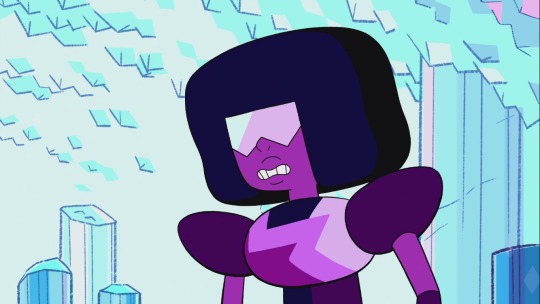
Garnet isn’t a total wet blanket here, and provides some of the episode’s biggest laughs (her bit on the Slinker’s name is topnotch use of Estelle’s deadpan), but her role here is the mom to both Steven and Amethyst. It’s fascinating to watch her get frustrated in a way she rarely does with Steven, and “frustration” is the key here: Reformed smartly doesn’t let her impatience boil over into true anger and force a fight between Garnet and Amethyst, because Garnet isn’t the problem. Moreover, the fight with Pearl in On the Run culminated many episodes of conflict, and a week-long feud between Garnet and Pearl is coming soon, so another big brawl here would definitely dilute the oomph of Crystal Gem infighting.
Steven’s in full-on observation mode, aided by the quiz gimmick, but his role as an audience is crucial: Amethyst loves having someone to show off to, and if it’s just her and Garnet the conflict would have resolved with minimal introspection. It’s a clever trick for making him matter without making him the main character, something the show hasn’t always balanced well in the past.
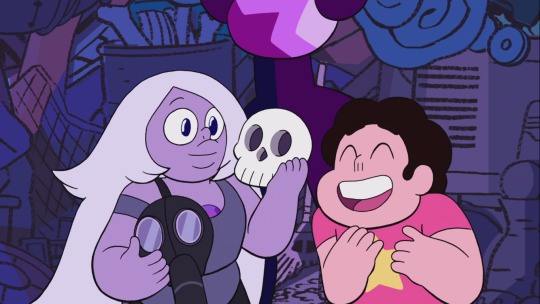
It’ll be a while before Amethyst’s arc really revs up, but that makes an episode like Reformed extra important. A deep look like this leaves a long impression, and by the time Season 3′s endgame rolls around and all sorts of new adventures have come and gone, the issues reinforced here will still be easy to remember.
(Oh, and I hope you enjoyed the original theme song, because it’s the last time we’re hearing that version now that all three Gems have new forms.)
Future Vision!
Considering this is the start of Amethyst’s arc through the next season, expect plenty of episodes to continue the conflict of Reformed.
We’re the one, we’re the ONE! TWO! THREE! FOUR!
Okay, so this is a pretty rave review, I don’t rewatch this one too often; it’s a great overview of Amethyst with some good jokes, but our look into her deep-seated issues is uncomfortable by design, and we don’t get any major relief from it in the way Connie provides in Sworn to the Sword and Peridot brings in Keeping It Together. It’s a wonderful and important episode, but purely in terms of what I like to watch, it doesn’t quite cross the “Love ‘em” threshold.
Top Fifteen
Steven and the Stevens
Mirror Gem
Lion 3: Straight to Video
Alone Together
The Return
Jailbreak
Rose’s Scabbard
Coach Steven
Giant Woman
Winter Forecast
On the Run
Warp Tour
Maximum Capacity
The Test
Ocean Gem
Love ‘em
Laser Light Cannon
Bubble Buddies
Tiger Millionaire
Lion 2: The Movie
Rose’s Room
An Indirect Kiss
Space Race
Garnet’s Universe
Future Vision
Marble Madness
Political Power
Full Disclosure
Joy Ride
Like ‘em
Gem Glow
Frybo
Arcade Mania
So Many Birthdays
Lars and the Cool Kids
Onion Trade
Steven the Sword Fighter
Beach Party
Monster Buddies
Keep Beach City Weird
Watermelon Steven
The Message
Open Book
Story for Steven
Shirt Club
Love Letters
Reformed
Enh
Cheeseburger Backpack
Together Breakfast
Cat Fingers
Serious Steven
Steven’s Lion
Joking Victim
Secret Team
Say Uncle
No Thanks!
4. Horror Club 3. Fusion Cuisine 2. House Guest 1. Island Adventure
13 notes
·
View notes
Link
This week on Dear Television: Lili Loofbourow and Irene Yoon talk through the third season finale of Crazy Ex-Girlfriend. There are spoilers in here, so if you haven’t seen the episode, “Nathaniel is Irrelevant,” please do so, for your own sake!
LILI LOOFBOUROW: In honor of the CW officially renewing Crazy Ex-Girlfriend for a fourth season, we decided to have a yak about the season three finale and where we think the show is headed next. We also love this tremendous show deeply and consider Rachel Bloom a genius. And yet we were both … troubled … by the finale. Is that fair to say?
IRENE YOON: Totally. Paula’s song, “The Miracle of Birth,” at the top of the episode was one of my favorite moments all season. Everything from the costumes and set to the lyrics and Champlin’s delivery carried the show’s signature stamp of brilliantly over the top and uncomfortably on point at the same time. So it seemed strange for the episode to end in what felt like a rather uncoordinated jump to grounding epiphany, storyline wobble, and series cliffhanger all at once!
LL: There are issues! They might be genuine problems, or they might be hints at where the show plans to go next. SHALL WE COMMENCE?
IY: Yes! Let’s talk first about how Crazy Ex-Girlfriend usually handles finales. I want to love the trajectory that the three finales collectively suggest for the show, but I’m a little uneasy. Season 1 ends with a bewildered and vaguely horrified Josh Chan cuddling Rebecca as she waxes poetic about their love story finally taking off (in the backseat of a car, as love stories do). Season 2 ends with Paula and Rebecca holding hands, flanked by Valencia and Heather, in a reconfiguration of the thwarted wedding scene as they vow to destroy Josh together. Season 3’s “Nathaniel is Irrelevant” ends with the camera moving between close-ups of Rebecca and Paula in the courtroom. Both Nathaniel and Josh are in the room, but it doesn’t really matter. Paula silently conveys her approval and forgiveness for Rebecca as the latter pleads guilty—in a bewildering twist—to the attempted murder of Trent.
With its four-season arc (Rachel Bloom recently confirmed the fourth season as its last), the show seems to be building up to some apotheosis of Rebecca and Paula’s friendship, finally outside of the auspices of scheming for or against Josh Chan. I just wish the grounds for this moment of seeming self-awareness and mutual recognition weren’t so troubling! Namely, why on earth would pleading guilty to attempted murder by reason of insanity or pleading guilty to attempted murder by reason of needing to be, like, a better person in general be the only available options?
LL: Yes! This does seem extreme.
IY: The choices double down on the narratives of Rebecca as the under-medicated and over-invested ex-girlfriend (who, as others in the episode remind her, has shown up at a party where two of her ex-boyfriends are and thrown one of them off the roof) or the evil, scheming, dark-haired villain fueled by criminal intent. We’ve been there and done that a couple of seasons over—by the end of season three, it feels like there should be another option—from both a legal and a narrative perspective.
Also, why would Paula nod approvingly at her best friend unnecessarily pleading guilty to attempted murder? It doesn’t seem quite the proportional response to their friendship issues, but maybe that’s the point?
LL: Like, atonement, you mean? Something like that?
IY: Atonement maybe, but the show also seems invested in flagging the resolution’s own insufficiency (or excessive sufficiency? over-sufficiency?) in an interesting way. There’s so much in this episode and in all of the preceding seasons, that seems set up to make us read this courtroom scene as a moment of personal triumph for Rebecca and Paula, but it feels very purposefully off-kilter and weird.
LL: Off-kilter and weird is right! I’ve watched the finale three times now, and I agree with you that the moment Paula and Rebecca lock eyes feels pregnant (heh) with meaning: to the extent that Paula acts as Rebecca’s conscience here, it’s clear that they’ve mutually decided that this is, indeed, the Right Thing.
Which is, as you point out, ludicrous! (I had the same fears you did—I worried that Crazy Ex-Girlfriend had literally lost the plot.) But having rewatched it twice now, I think—this is my gamble—that the show knows exactly how ludicrous this solution to the problem of Rebecca’s malfeasance is. I suspect, in fact, that in preparation for a fourth season that’s ostensibly about recovery, the finale is making a point about the faux-epiphanies both our heroines are prone to—and the massive overcorrections in which they repeatedly engage.
These are both characters who struggle to Take Responsibility™. And I think the show is trying to figure out what true responsibility means within the really egregious frames we use to talk about love in this culture.
IY: Yes, absolutely! I really like that reading. It reminds me of the excessiveness of Rebecca’s affair with Greg’s dad—and the strange persistence of its spectre on the show. Her epiphany can’t stop with her recognizing that she and Greg shouldn’t be together. She needs to take it a very large and toxic step further and to berate herself publicly for it—including putting it on all three lists of wrongs she committed against Nathaniel, Josh, and Paula, respectively. The transgression didn’t really belong on any of their lists, much as it didn’t really seem to factor into any of the plotlines that followed its occurrence, but Rebecca insists nonetheless “everyone should know.”
LL: Crazy Ex-Girlfriend started out satirizing a certain script about romance; specifically, the way men always talk about their “crazy” ex-girlfriends. The brilliance of that parody was its double-edge: yes, it proved that the “crazy” ex-girlfriend in question—our Rebecca—was in fact charismatic, professional, intelligent, and lovable. But she was also excusing a million kinds of inappropriate behavior and justifying herself by referring to our culture’s toxic scripts about love.
In other words, this was always a send-up of both the kind of man who dismisses his exes as “crazy” without examining his own complicity. But it’s also a send-up of the woman who uses LOVE and a particular kind of manipulative femininity to indulge her worst impulses.
By the S3 finale, Rebecca—as the credits to this season neatly illustrate—has somehow come to occupy every position in this toxic love script. She’s the vengeful fury, the sex kitten, and the dude. (The Trent parallel really drives this last bit home.)
But the “crazy” label definitely lost some of its ironic edge this season. Granted, the “craziness” Rachel Bloom set out to satirize might not be exactly real by the end of Season 3, but Rebecca does have a diagnosis. She has Borderline Personality Disorder, and the show’s portrayal of her messy progress and messier backsliding has been entirely believable and a little hard to watch. Rebecca is willing to do as much homework as you want her to—that feels so right—but in her real life, she just keeps making mistakes. Frankly, I’m not sure “mistakes” is even the right word, especially given how much Rebecca and Nathaniel’s song lampoons that framework. That she repeatedly threatens to kill herself and blame George in order to get him to do her bidding isn’t a mistake. It’s an obvious index of how destructive and manipulative she remains. Despite the occasional sincerity of her efforts (her decision to break up with Nathaniel was heartbreaking) Rebecca hasn’t actually been in recovery. She’s been in denial.
And this episode did, after all, take the trouble to remind us of exactly how awful Rebecca has been.
IY: So true. The episode seems to want to call attention to both how awful Rebecca has been and how her behavior marks her distance from the more sincere (if fewer) moments of reckoning with her mental illness. I also like thinking of the unevenness as quite intentional here in light of the longer arc of the season and show—especially where the messiness of her (non-)recovery is concerned.
The title of the finale recalls episode 6 of the season, “Josh is Irrelevant,” where Rebecca comes to terms with her friends in the aftermath of her suicide attempt. The echoes seem particularly, well, relevant.
“Josh is Irrelevant,” like “Nathaniel is Irrelevant,” features a moment of reckoning and apology. While Rebecca is in the bathroom playing the music video viewing scene of the S3 Theme Song (cue: fury, kitten, dude!), Paula, Heather, and Valencia worry that she might be attempting suicide again. The four share a poignant and difficult moment in which Rebecca apologizes for the terrible things she had said to them earlier and the stress she’s causing now and admits that she can’t promise that she won’t ever try to kill herself again, as much as she wishes she could–one of the most powerful moments in a season dedicated to facing squarely difficult and painful aspects of mental illness. The first apologies Rebecca makes in the season finale, however, are not nearly so organic or heartfelt. Convinced that she’s begun hallucinating images of Trent as a manifestation of her guilt, Rebecca types up blanket confessions focused on alleviating her own feelings of guilt rather than responding to the hurt she caused her friends unbeknownst to them. Everything in the scene seems a little imbalanced and more than a little weird.
LL: Exactly! It’s the opposite of a true apology! She’s gambling that confessing will save her sanity. It’s really not about them.
IY: And their reactions variously underscore that. While Rebecca has done pretty awful things to everyone—including, significantly for an episode that ends with her in an orange jumpsuit, threatening the lives of people Josh and Nathaniel care about—Josh demonstrates little response to the news that Rebecca possibly tried to have his grandfather killed and father deported except eventually to punch Nathaniel; Nathaniel’s vague surprise and annoyance that Rebecca put a hit on his girlfriend subsides rather quickly. In this moment, indeed, Nathaniel and Josh both become somewhat irrelevant.
Paula, however, having read that Rebecca lied to her to get her help, rushes out of the room in a tearful rage and calls off their friendship in toto!
LL: Right, and the thing about that is that no one’s reaction here scans. The very idea that Paula’s grudge about being lied matters more than attempted murders and deportations is … well, crazy. We get it: lady-friendship matters more than any man. But this is a garbled way of delivering that message. At this point in the finale, the show itself seems dazed and lost.
IY: Yes! And the reprise of the “X is irrelevant” construction shows that we’re drifting away from anything like moral clarity rather than moving toward it. The revelation that registers as a moment of clear-sightedness and self-possession in episode 6, comes off as well, muddled and confusing in the season finale. Rebecca’s declaration of Josh’s irrelevance in episode 6 more or less sealed his irrelevance for the rest of the season: it was right. As much as I love Vincent Rodriguez III on the show, Josh is irrelevant. Instead of a similar organic declaration about Nathaniel here, we have the strange unspoken exchange between Paula and Rebecca in the courtroom.
If Rebecca’s attempts—often disproportionate, self-destructive, and unnecessarily extreme given the circumstances–to demonstrate her love and devotion to her various beaus are out, is the conclusion of season three just another disproportionate, self-destructive, and unnecessarily extreme attempt to demonstrate her devotion to Paula instead?
LL: Right, maybe this is the latest instance of her tendency to inappropriately overlove. (Kind of like how she tried to prove her love for Nathaniel by finding his “sister”?)
IY: Totally. And we have, of course, been alerted to the dangers of both overloving and easy substitution through none other than the attempted murder victim, Trent. As Trent likes to point out repeatedly to Rebecca—and as the show likes to point out to us through his repetition of her songs in a variety of refrains—he’s the crazy ex-boyfriend to her crazy ex-girlfriend. It’s in part Rebecca’s gnawing sense of guilt that this is the case that prompts her to confess her sins to Paula, Josh, and Nathaniel. But, while the season repeatedly demonstrates her willingness to contemplate endangering Josh’s family and Nathaniel’s girlfriend, she always stops short of actually allowing any of it to happen.
LL: Right. She actually does have brakes.
IY: Whereas a deranged Trent is ready to plunge a knife into Nathaniel when Rebecca runs up to them. Rebecca schemes and creates various artificial situations to convince Josh to spend more time with her; Trent actively and repeatedly blackmails her, physically marching her around her office in an uncomfortable and unwanted performance of their relationship. As deeply flawed as Rebecca is, she isn’t quite Trent.
LL: That’s a really good point.
IY: In the opening scene of this episode, where Rebecca dreams about brushing her hair in the afternoon light before her mirror, she sees herself transfigured into Trent doing the same. The fact that the opening scene calls explicit attention to Rebecca and Trent’s hair was notable given how the season opens with Rebecca dyeing her hair dark brown to indicate her vengeful rage for Josh (“I know, my hair is dark so I look evil, but I’m wearing white so it’s ironic”) and ends with Trent in an absurd orange-y wig trying to murder Nathaniel because of his vengeful rage for Rebecca.
Weirdly, the effect of the dream scene’s lighting renders Rebecca’s hair closer to the original light brown, and Trent’s an approximation of the deranged orange to come. So while the scene overall seems to suggest the doubling of their narrative arcs (and less-than-balanced tendencies toward attachment) that’s been heavily underscored by the use of both instrumental and sung refrains of Rebecca’s songs via Trent, there’s also a sense of a key divergence here when they’re examined side-by-side, literally under the same light.
LL: THIS IS HIGH-QUALITY THEMATIC HAIR ANALYSIS. I AM CONVINCED. (At some point, we ought to mention the perfection of Paula’s hair in “The Miracle of Birth” too.) You know, I wonder whether this imperfect parallel between Trent and Rebecca works is a clue re: how to read the other broken road maps in this episode. Take that amazing song of Paula’s (aka one of the most spectacular things to have ever happened on television). It lays out in excruciating detail everything Heather will undergo, but almost none of it (except for the bloody show) seems to accurately reflect Heather’s experience. She’s reading magazines throughout and sweaty but unbothered after giving birth. The same is true for other projected arcs: Trent’s Instagram story scheme doesn’t go the way he thinks it will. Neither does Darryl’s project of having everyone in the room for the delivery. Basically, nothing in this episode follows the carefully-explained plan. The messiness seems deliberate, in other words. It’s thematized, baked-in.
IY: Totally. And the stakes of baked-in messiness are really interesting where Trent as a character is concerned. Trent figures, on the one hand, as an absurd convenience for any sticky plot point, hauled out from one full body cast to move things along before being shoved (literally) into another, and on the other, as the physical embodiment of the violence and harm of Rebecca’s machinations. The last episodes of the season do make clear the ways in which Trent’s presence, in all of his obsessive and threatening behaviors, is a byproduct of Rebecca and Paula’s scheming around Josh.
LL: Trent is such a problem. I can’t work out whether he’s a useful foil or a caricature who isn’t granted the sympathy Rebecca gets, or both? I do think it matters, from a purely pragmatic POV, that Rebecca did push him, and endanger his life, and that she can admit that she did without revving up the excuse machine. Pleading “responsible” is a step that does genuinely matter–morally, even if it’s legal nonsense, and even if it’s a massive ethical hyper-correction. I’m betting that the show has a handle on this, though, and my evidence that it does is the arc we see within Nathaniel and Rebecca’s last song, “Nothing is Ever Anyone’s Fault”:
Before I knew you
I did bad things and didn’t know why
But now, I know you
And I’ve learned to look inside
I understand what makes me
Frightened and sad
So yes, I still do bad things
But are they actually bad?
No!
I love this articulation of how Rebecca and Nathaniel are basically substituting another toxic cultural script–the self-justifying self-help epiphany–for the love narratives Rebecca’s trying to leave behind. That lethal slippage from healthy introspection to nihilistic self-justification is definitely a tendency in America. And it’s one a diagnosis (like Borderline Personality Disorder) can accelerate in people built like Rebecca and Nathaniel. Labeling ourselves can become a way to shirk real responsibility. I love that the show confronts that, and I take these lyrics as a promise that it’s going to keep thinking through these metaphysical conundrums. Here’s hoping the next season tracks Rebecca’s smart and difficult climb out of this, her latest (terribly relatable) trap!
IY: I love that reading! It also makes so much sense insofar as the wobbliness of expectations in the courtroom scene between Rebecca and Paula is emphatically set up by the surprising reversal of Rebecca and Nathaniel’s “love” song. Nathaniel had gotten awfully nice and sympathetic by this point in the season, and, as you pointed out, Rebecca’s choice to break up with him earlier on was indeed heartbreaking. So the slide into gross self-justification in the guise of an impassioned love song was quite a surprise, though maybe it shouldn’t have been, given their joint cheating and plotting of murders and deportations, etc.
On the flip side, the show’s done a remarkable job of developing Paula and Rebecca’s friendship as one that is deeply loving and deeply flawed. I’m not sure what the next and final installation of the series holds, but I share your optimism that Season 4 won’t disappoint with any oversimplified substitutions of female friendship for romantic relationships with men or of accessible labels for messy responsibilities.
The post Fury, Kitten, Dude: On Crazy Ex-Girlfriend appeared first on Los Angeles Review of Books.
from Los Angeles Review of Books https://ift.tt/2qpkV2V
0 notes